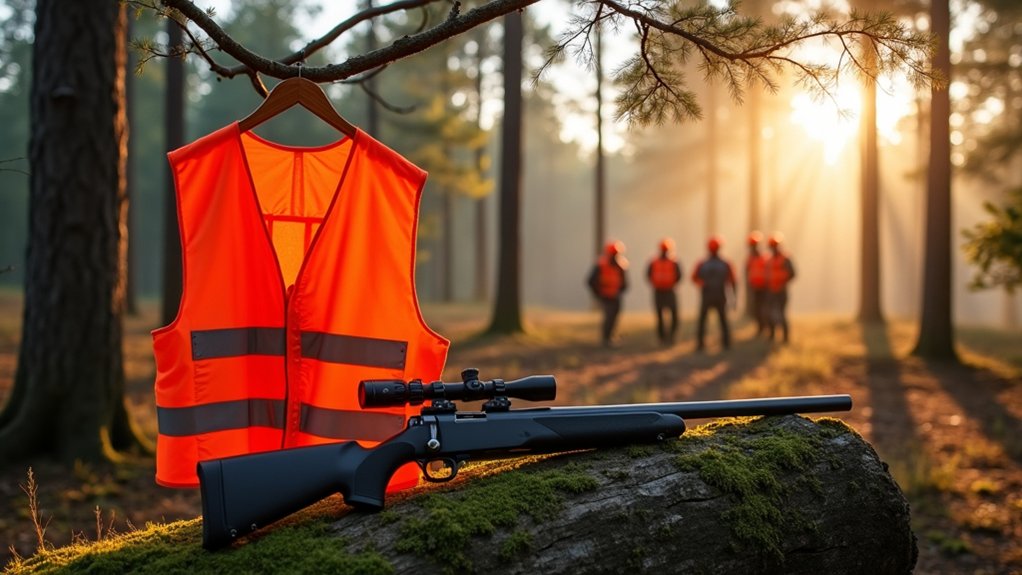When you’re out in the field, the last thing you want is an accident. Hunting can be thrilling, but it carries risks that you need to manage. By focusing on safety, you not only protect yourself but also your hunting companions. From choosing the right gear to understanding communication protocols, there’s a lot to reflect upon. What steps can you take to guarantee a safe and enjoyable hunting experience? Let’s explore some essential tips.
What is Hunting Accident Prevention and Why is it Important?
When you head into the woods for a hunting trip, understanding hunting accident prevention can be a game changer for your safety and enjoyment.
It means being aware of the potential hazards and taking proactive steps to minimize risks. This includes knowing your surroundings, using proper gear, and following safety protocols.
It’s vital because accidents can lead to serious injuries or even fatalities, ruining your trip and affecting your loved ones.
By prioritizing accident prevention, you not only protect yourself but also others in your party.
Ultimately, it enhances your overall experience, allowing you to focus on the thrill of the hunt.
How to Choose the Right Hunting Gear for Safety
How can you guarantee your safety while hunting? Choosing the right gear is essential.
Start with a reliable firearm that suits your experience level. Invest in a quality hunting vest with bright colors for visibility. Always wear a safety harness when using tree stands and sturdy boots for traction.
Don’t forget eye and ear protection to guard against injury from noise and debris. Opt for waterproof gear to keep you dry and comfortable.
Finally, make sure your gear fits properly; ill-fitting equipment can hinder your movement and reaction time. Prioritize safety gear that enhances your awareness and keeps you protected in the field.
What Are the Common Causes of Hunting Accidents?
While many hunters are experienced and cautious, accidents can still happen due to a variety of factors. One common cause is poor visibility, which can lead to misidentifying targets.
Additionally, a lack of communication among hunting parties often results in unsafe situations. Inexperience also plays a role; new hunters may not fully understand gun safety rules or proper handling techniques.
Moreover, distractions, such as mobile devices, can divert your attention at critical moments. Finally, not following established safety protocols, like wearing blaze orange, can increase the likelihood of accidents.
Stay aware of these risks to help guarantee a safe hunting experience.
How to Educate Yourself and Others About Hunting Safety
Understanding hunting safety is essential, especially if you want to protect yourself and others in the field. Start by taking a certified hunting safety course; these programs cover critical topics and provide hands-on experience.
Read books and articles focused on hunting safety to deepen your knowledge. Share what you learn with fellow hunters, whether through discussions or informal workshops. Always encourage your hunting partners to stay informed and practice safe habits.
Additionally, consider joining local hunting clubs, where you can exchange tips and experiences. Remember, ongoing education is key to preventing accidents and ensuring a safe hunting experience for everyone.
What Safety Measures Should be Taken Before Heading Out?
Before you head out for a hunting trip, it’s essential to take several safety measures to guarantee a secure experience.
First, always check your gear—make sure your firearm is clean and functioning properly. Wear appropriate clothing, including blaze orange, to enhance visibility. Review local hunting regulations and verify you have the necessary permits.
Inform someone about your plans, including your expected return time. Pack a first-aid kit and emergency supplies, including water and a flashlight.
Finally, familiarize yourself with the area and weather conditions to avoid unexpected challenges. Taking these precautions will help guarantee a safer hunting adventure.
How to Communicate Effectively With Your Hunting Party
Effective communication with your hunting party can make all the difference in ensuring a safe and successful outing. Here are a few tips to enhance your interactions:
- Establish clear signals: Agree on hand signals or calls to use in the field for alerting each other without making noise.
- Share your plans: Discuss your intended routes and areas to hunt, so everyone knows where to expect each other.
- Check-in regularly: Set specific times to regroup or check in, ensuring everyone feels safe and accounted for throughout the day.
What Should You Do in Case of a Hunting Accident?
In the unfortunate event of a hunting accident, staying calm and acting quickly can make a significant difference in the outcome.
First, assess the situation and check for injuries. If someone is hurt, call for help immediately, providing clear details about your location and the nature of the accident.
Apply first aid if you’re trained to do so, and keep the injured person still until help arrives. If it’s safe, secure the area to prevent further accidents.
Finally, document what happened for future reference. Remember, your swift actions can save lives and improve recovery chances.
How to Stay Updated on Hunting Laws and Regulations
How can you guarantee you’re always in the loop about hunting laws and regulations? Staying informed is essential for safe and responsible hunting.
Here are three effective ways to keep up:
- Follow local wildlife agencies: Subscribe to newsletters or alerts from your state’s wildlife department.
- Join hunting organizations: Engage with groups that provide updates on laws and best practices.
- Attend seminars and workshops: Participate in events that focus on hunting regulations and safety.
